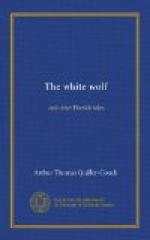“We now moved forward again, very cautiously, and soon came to the village. The houses, perhaps a dozen in all, were scandalously dirty, otherwise pretty much like those in Hamid’s own village. But not a living creature could be seen. Hamid, I could tell, was puzzled, and even a bit frightened. He put a good face on it, all the same, and began to walk from house to house, keeping his spear handy as he peered in at the doors. Still not a soul could we find, barring an old goat tethered and a few roaming fowls. The stink of the place sickened us, and I wanted to run, though we came across no actual horrors. In one room we found a pan of rice lately boiled and still smoking, and sprinkled it with lime juice. It remained good rice. Out into the street we went, and Hamid, growing bolder, raised a loud halloo. The noise of it sent the fowls scudding, and the hills around took it up and echoed it.
“He looked at me. ‘They must be out on the hunt,’ said he.
“‘Good Lord!’ I gasped. ‘And the child at home—without the pearl!’ I turned and plunged for it down the slope like a madman.
“What to do I had no idea; but I hadn’t a doubt that the Berbalangs were after Aoodya or the child, or both, and I headed for home with the wind singing by my ears. At the foot of the pass I looked back. Hamid was following, skipping from one lava stone to another at a pace that did credit to his old legs. He waved a hand and called—as I thought, to encourage me; and away down I pounded.
“I must have reached the edge of the plain in twenty minutes (the climb had taken us more than two hours), and, once there, I squeezed my elbows into my sides and settled into stride. Luckily the season was dry, and a fire, three weeks before, had swept over the tall lalang grass, leaving a thin layer of ash, which made running easy. For all that, I was pretty near dead beat when I reached the compound and ran past the sentry. The man cried out at sight of me as I went by; but I thought he was just pattering out his challenge, being taken unawares; and knowing he would not let off his musket if he recognised me, I paid no attention.
“I had prepared myself (as I thought) for anything—to find Aoodya dead beside the child, or to find them both unharmed and flourishing as I had left them. But what happened was that I burst in and stared around an empty room. That knocked the wind out of my sails. I called twice, leaned my head against the door-post and panted; called again, and, getting no answer, walked stupidly back across the compound to the gate.
“The sentry there was pointing. I believe he was telling me, too, that Aoodya, with the child in her arms, had passed out some while before. But as he waved a hand towards the plain I saw a figure running there, and recognised Hamid. The old man was heading, not towards us, but for the seashore, and, plain as daylight, he was heading there with a purpose. I remembered now his cry to me from the head of the pass. So I pressed elbows to side again and lit out after him.




